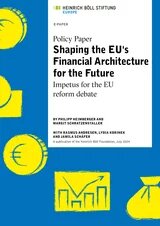We are in the midst of a fundamental global political and economic re-ordering. Revisionist states are challenging the geopolitical order and questioning the territorial status quo in Europe and Asia. Economic competition on the world market is fierce, as evidenced by the struggles of traditional European industrial powerhouses such as Volkswagen and ThyssenKrupp. Cracks in the foundations of European prosperity are emerging. The days when Europe could outsource its security to the Americans, benefit from cheap Russian energy, and easily sell its goods to the world are ending. Europe needs to rethink its foundations. This means investing in decarbonisation, digitalisation, and defence. But this cannot be done on the cheap.

Over the next five years, two issues will dominate the European political agenda: competitiveness and security. These themes featured prominently in both the political demands of the largest groups in the European Parliament and Ursula von der Leyen’s political guidelines for the next European Commission, published in July 2024. The latest voice joining this chorus is Mario Draghi. In his 400-page report on how the EU could boost growth while transforming its economy, published last week, he emphasises that Europe must focus on technological innovation, competitiveness, and increasing security.
We are in the midst of a fundamental global political and economic re-ordering. Revisionist states are challenging the geopolitical order and questioning the territorial status quo in Europe and Asia. Economic competition on the world market is fierce, as evidenced by the struggles of traditional European industrial powerhouses such as Volkswagen and ThyssenKrupp.
Cracks in the foundations of European prosperity are emerging. The days when Europe could outsource its security to the Americans, benefit from cheap Russian energy, and easily sell its goods to the world are ending. Europe needs to rethink its foundations. This means investing in decarbonisation, digitalisation, and defence. Draghi rightly points out that decarbonisation in particular is a growth opportunity for European industry.
Certain European political actors are, however, convinced of the opposite. They believe that the European Green Deal is an obstacle to enhanced competitiveness and must be watered down – or even abandoned entirely. This is a serious error of judgement. While a weakened Green Deal might deliver some immediate short-term advantages, over the medium and long term it would hurt European industry: more sustainable companies from Asia and the US would outcompete their European counterparts, particularly in the future zero-emissions growth markets. Instead of talking or watering down the European Green Deal, it is necessary to expand the industrial potential that it offers.
But this cannot be done on the cheap. Mario Draghi estimates that the “three Ds” will require immense investment; up to 800 billion euros a year. For its part, the German Federation of Industries (BDI) estimates that a massive investment programme to the tune of 1.4 trillion euros by 2030 is necessary to keep Germany’s industry competitive.
So where will this money come from? There are low-hanging fruits, such as completing the European single market, the capital markets union, and energy union, which could help create economies of scale and facilitate investments, as highlighted in Enrico Letta's report on the future of the single market. There is the possibility of new advantageous trade deals. And there is an opportunity in reducing bureaucratic burdens, streamlining processes, and speeding up permitting procedures. But public investments – especially when used to leverage private capital – will play a central role. In this context, the discussions on financing common European debt, the future of the EU multi-financial framework, and the EU’s own resources will be crucial.
At the Heinrich-Böll-Stiftung European Union, we are contributing to this emerging political agenda in a variety of ways. Read the assessment of the Draghi report by Sander Tordoir, Chief Economist at the Centre for European Reform, and our study on Green visions for the European Single Market.
This month, we will also be releasing our Risk Radar for the European Green Deal, which analyses the state of play of the Green Deal’s 13 most important legislative files and identifies the potential risks they face of being delayed, defunded, undermined, or even withdrawn during this upcoming legislative period. Registrations for our 26.09 webinar on the risks to the Green Deal are now open. And in October, we will organise a public discussion on European industrial policy.
In the meantime, I also invite you to read our interview on European democratic resilience and the rule of law with outgoing Commission Vice-President Věra Jourová, and our infographic on what to expect in the first 100 days of the von der Leyen II Commission.
Read more in our Böll EU 7/2024 Newsletter!
Warm regards,
Roderick Kefferpütz, Director, Heinrich-Böll-Stiftung European Union


